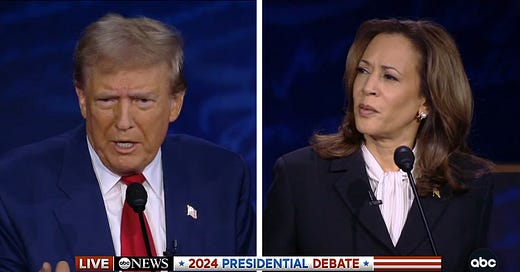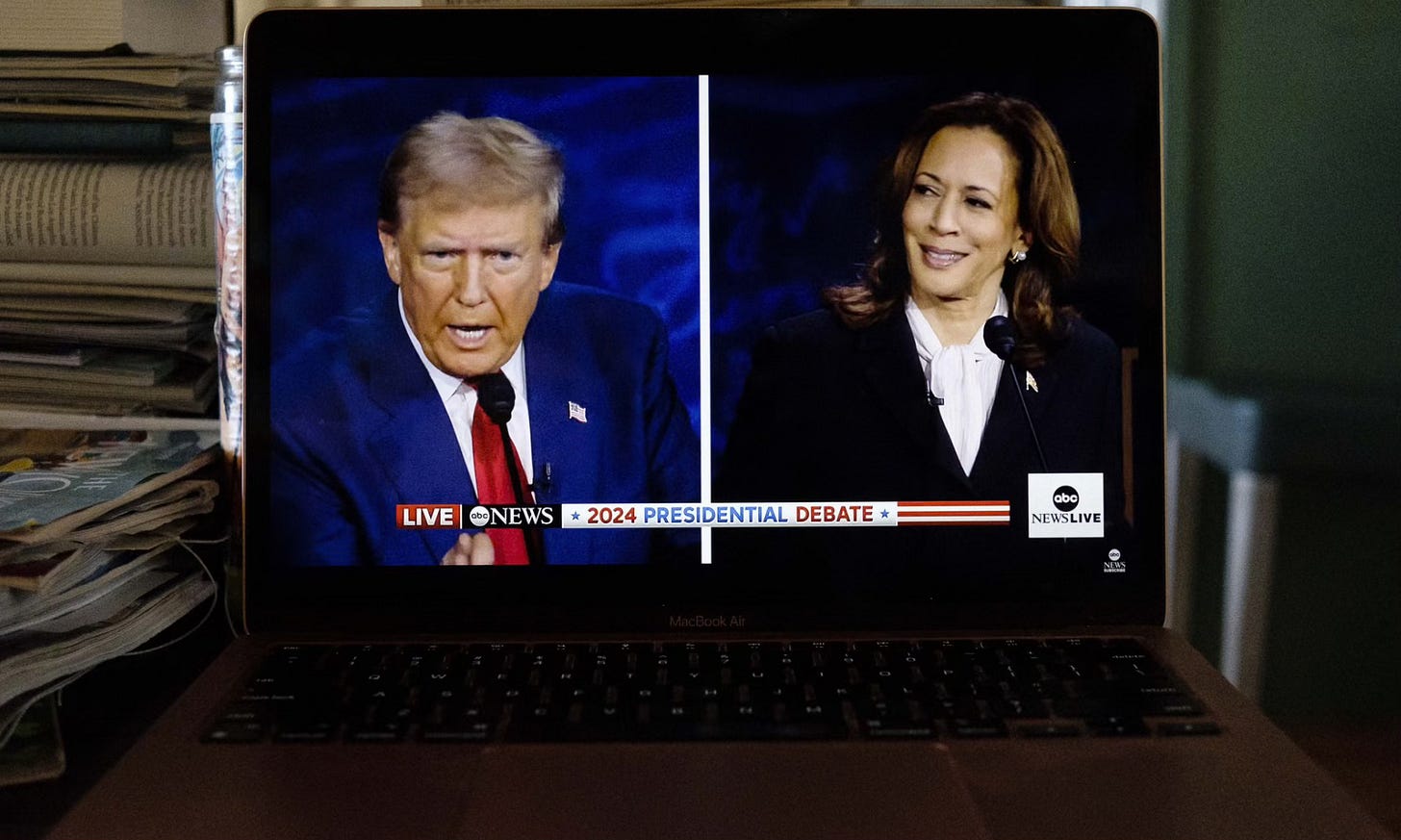Last Tuesday’s presidential debate between Kamala Harris and Donald Trump is one of the few times that I can remember Trump losing a debate, but Harris’ victory did not feel how I anticipated. Harris’ victory felt like a subtle yet profound victory with large implications and not your normal debate success, and here’s why.
Harris’ satisfying and overwhelming victory in the debate is significant and further increases her chances of winning the White House. But over the last eight years, Trump has reduced the presidential debate format into a spectacle that is devoid of substance and full of the airing of grievances, pandering to his base, and a barrage of lies. He’s turned debates into non-debates, and this has made it incredibly hard for Trump’s challengers to win a debate that does not permit debating.
Trump’s non-debating has also made presidential debates less meaningful, but Harris victory last week is already having a meaningful impact on the national polls. According to post-debate polls, Harris has increased her lead over Trump since the debate and her national lead has moved beyond the margin of error.
Harris won this debate not through her debating skill and expertise, but by making Trump look weak. She knew Trump’s ploy and when he ramped up the spectacle, she poked, prodded, and baited the Republican Party’s tough man leader into looking weak. Harris succeeded where numerous others—Jeb Bush, Ted Cruz, Hillary Clinton, and Joe Biden to name a few—have failed. Harris won last week’s debate because she defeated Trump at the non-debating.
This is what Trump has turned debates into. This is what winning looks like today. And this is why Harris’ victory, at least for me, elicited a peculiar feeling that I could not adequately process at the time despite this outcome being exactly what her campaign needed.
As I watched Trump ramble, spew lies, and become increasingly frustrated, I first thought about a quote from philosopher Ludwig Wittgenstein: “The limits of my language means the limit of my world.”
We have always known that Trump had the vocabulary and syntax of a child, but since he is the leader of the Republican Party, his supporters have argued that his limited language makes him more relatable and expands his world. This argument is an absurdity and, last Tuesday, his lack of language and abundance of outrageous statements—such as immigrants eating dogs and cats, and “Abdul” running the Taliban—showed everyone the limitations of his world. For eight years, Trump has worked to make everyone’s world as small and as limited as his vocabulary.
During the debate, we could see Trump’s smallness because he failed to make Harris look small. In America, a Black woman refusing to let a bigoted white man make her small has always been one of the most profound and transformative victories, but rarely do you see this type of victory during a debate and with 67 million people watching. Sixty-seven million people did not watch Rosa Parks refuse to sit at the back of the bus. Sixty-seven million people did not watch 6-year-old Ruby Bridges remain tall and strong despite her youth as she withstood racist abuse and attended a desegregated school in 1960.
Comparing Harris’ debate performance to the struggles of the 1960s and the fight to end Jim Crow might seem outrageous, but if she becomes America’s first Black woman president, we will look back on this debate and realize that it was not a small moment at all. And in fact, it was very, very big.
Debating a Clown
Throughout Harris’ political career, her laughter and fun disposition have always been a topic of discussion. Many people argued that her humor and joy could be interpreted as signs of weakness, and that she needed to present herself as a stern or more serious politician. For the last four years, Harris’ laughter had been a thing of the past. However, since she became the Democratic nominee, her joy and laughter has propelled her campaign, and it also played a pivotal role in her debate night success.
Harris’ ability to laugh at Trump’s absurd statements not only made Trump look weak, but it made him look like a clown. The live split screen that juxtaposed the quasi-coherent ramblings of a frustrated man wearing too much bronzer and a polished professional who could not help herself but laugh made Trump’s clownish spectacle unmistakable.
As I watched the debate, and observed Harris’ bemused expressions as Trump lied and rambled, I also thought about an old Turkish proverb: “When a clown moves into a palace, he doesn’t become a king. The palace becomes a circus.”
Harris won by not becoming small. And by not becoming small, Harris made Trump look like a clown.
For the four years that he resided in the White House, Trump turned the presidency into a circus, and now the issue that has consumed our democracy centers not just on removing him from our palace of democracy, but also preventing him from returning.
In November 2020, when Joe Biden became the president-elect most Americans believed that he had successfully extricated the clown from the White House. But as we would soon find out, the clown had no intention of leaving.
He refused to concede defeat. He filed lawsuit after lawsuit challenging the results of the election. He instigated an attack on the U.S. Capitol to prevent the certification of the election results, and when he finally left, he decided to take classified documents with him. Mar-a-Lago soon became the “Southern White House” and he existed as a president in domestic absentia whose life revolved around reclaiming the palace. And if he returned to the palace it was feared that he would figure out a way to never leave.
The specter of the return of the clown has loomed over the entirety of Biden’s presidency, and for eight years the weight, breath, and relentlessness of Trump’s clownishness has crushed and suffocated his challengers.
A clown shows up to a debate with a strategy of petty name-calling and destroying the debate. A clown views the presidency as a means for enriching himself and not the American people.
The American people have already removed this clown from the White House once, but this election is different from 2020. In this election, the goal is to vanquish the clown forever. The Turkish proverb does not touch upon the methods for defeating the clown, but this is what I thought about as the debate continued.
With each chuckle, laugh, and look of disbelief; and the growing frustration from Trump, I became more and more convinced that exposing and recognizing the clown before us might be the best strategy. This is similar to the child in the Hans Christian Andersen fairytale proclaiming that the emperor is not wearing any clothes.
Harris knew she was going to win the debate before it even started and she exuded this confidence because she knew that she was debating a clown. She took the debate seriously and prepared accordingly because she is not a clown, but most importantly, she did not expect Trump to be anything more than a clown.
Far too often, Trump’s adversaries hold onto a glimmer of hope that he may become more than what he has always been, and then they look surprised or disappointed when he shows them that he has not changed at all. The hope of Trump’s adversaries that he could rise above his clownish existence results in Trump making them look like clowns.
Everyone who believed that the dignity of the White House could change Trump now looks foolish. Those who debate Trump and expect a debate also look foolish.
Harris went into the debate expecting Trump and she prepared accordingly. She could see the clown without hoping that he could become more than a clown. This helped the viewers at home see even more of Trump, and maybe this is how you defeat the clown who claims to be king.
Maybe the end of the Turkish proverb should say: “To remove the clown from the palace, do not hope that he becomes a king. Just confidently laugh at the circus.”
Ever since Biden dropped out of the race and Harris became the nominee, it has been clear that Harris has been willing to laugh at the circus that is her opposition. One could say that she has molded her campaign around being able to do so. Tim Walz has many conventional progressive Democrat attributes, but he set himself apart from the pack of potential vice presidential nominees once he branded JD Vance and Trump as “weird.”
The Harris-Walz ticket does not take their opposition lightly. They know the importance of winning in November, and they know that they cannot rely on the American public to simply wake up and defeat Trump. They know that winning debates and issuing policy proposals will not be enough. They understand that they must do all of the above while still laughing at and unmasking their clownish opposition.
A week ago the American people witnessed Harris’ laughter and saw how it transformed a presidential debate and propelled her to victory. If Harris wins in November, watching a Black woman become president as she laughs at a bigoted clown will certainly become a transformative and unprecedented moment in American history.




